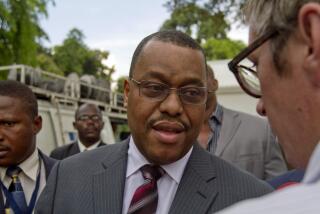CARIBBEAN : Once Derailed, Haiti Elections Back on Track : Pro-Aristide coalition expected to win control of Parliament, local offices.
PORT-AU-PRINCE, Haiti — This country’s first genuine elections since 1990 appear solidly on track for next month after an unsettled start that brought two delays and even a threat of cancellation.
The June 25 elections, with runoffs July 16, are for all offices except the presidency: Parliament, mayors and other local officials.
It will also be the first voting since President Jean-Bertrand Aristide was returned Oct. 15 from a three-year exile that followed his overthrow at the hands of the Haitian military.
There had been concern that fear, indifference and disorganization would result either in cancellation or such a low turnout that the elections would be discredited.
But about 10,000 candidates had signed up for the 2,000 open positions by the time candidate registration ended April 30. “It is a bit uneven,” said one diplomatic political expert, “with 20 or 30 running for one seat and only three or four for another, but I don’t think there is a single uncontested race.”
Early reluctance to declare for office was blamed to some degree on fears that candidates, particularly from pro-Aristide parties, would be targets of violence.
But reports of attacks on candidates have been few and far between. Most observers discount electoral violence as a serious impediment to the vote.
Voter registration has been more problematic. There are about 4 million eligible voters, but just two weeks ago no more than 30% had obtained registration cards.
Fear has been blamed for some of the reluctance to register, but organizational and financial problems are a bigger factor. Indeed, after the process was expanded and reorganized, the number has risen to about 60%, U.N. observers say, and it is expected to grow.
Registration, which was to end April 30, has been extended until May 30 in hopes of reaching 70%-75% of eligible voters.
That percentage would bring a great sigh of relief from U.S. and U.N. officials, who argued that the use of more than 25,000 American troops in Haiti was justified by the restoration of democracy at least as much as by the return of Aristide.
“We still have to wait until the votes are counted and the election truly certified,” a U.N. official said, “but if this vote is successful, I think we will be able to say that democracy is back and the days of dictatorship over.”
After Haiti’s military took power in September, 1991, the ruling generals twice held national elections, but Aristide’s followers boycotted them, and the international community refused to recognize the results.
Under one reading of the Haitian constitution, elections should have been held last January. In spite of strong urgings by the United States, the vote was put off, first until March, then to June 6 and finally to June 25.
“There was just no way the vote could have been held earlier, especially in January or March,” a U.N. official said. “The parties weren’t organized; there was no money and no process.”
Even though the process is going relatively well, there is no sense of strong public enthusiasm, with campaigning limited largely to slogans scrawled on walls and fences.
“Many, if not most, Haitians don’t really see the need for this vote,” another diplomat said. “They voted for Aristide in 1990, and they don’t see any reason to vote again. Most Haitians think Parliament and the rest just get in the way.”
There will be a presidential vote in December, but Aristide is ineligible to run for reelection, although there are demands by some of his followers that he be allowed to serve three more years to make up for his time in exile.
The United States and the United Nations have said they would not tolerate an extension, and Aristide has pledged to step aside in February as scheduled.
He and his supporters appear to have no worries about controlling the government after the coming elections.
Aristide, who has promised to act “as a referee” and stay out of the campaign, is represented by a three-party leftist coalition that is expected to win control of both houses of Parliament as well as most key local offices.
In fact, his only meaningful opposition, in the minds of most election experts and diplomats, will come from two other leftist groupings, which supported him in the 1990 voting.
“So, it really doesn’t matter,” a diplomat said. “The left will dominate. It is possible that the right-wing parties won’t win a single significant seat.”
More to Read
Sign up for Essential California
The most important California stories and recommendations in your inbox every morning.
You may occasionally receive promotional content from the Los Angeles Times.










